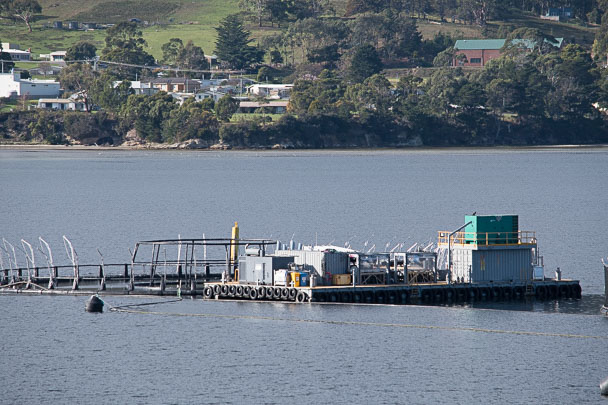Tasmanian salmon company confirms political donations as Tassal remains silent

Australia’s largest salmon producer, Tassal, has refused to say whether it donates to Tasmania’s political parties, but one of its competitors - Petuna - has confirmed it paid $12,000 to attend Liberal Party events last year.
Following heightened focus on the regulation of salmon farming in the state, including in author Richard Flanagan’s book Toxic, Tasmanian Inquirer asked the three salmon companies whether they made political donations.
Petuna - the smallest of the three, operating fish farms in Macquarie Harbour and one near the mouth of the Tamar River - said it paid the $12,000 as a subscription to attend Liberal forums for business leaders that were attended by government ministers.
Petuna’s chief executive, Ruben Alvarez, said: “In past years, Petuna has paid to attend events hosted by the government of the day. However, we have not paid to attend any events in the 2020-21 financial year.”
Tassal did not respond to repeated requests for comment. The state’s third salmon producer, Huon Aquaculture, said it has never donated.
Salmon farms are reliant on favourable government agency decisions including the allocation of leases over public waterways, environmental standards and levels of enforcement, protection of wildlife and access to clean water resources.
While Petuna has been a long-term political donor, only one contribution has previously been disclosed, a $1630 payment to the Tasmanian branch of the Liberal Party in the 2003-2004 financial year.
The Howard government lifted the federal disclosure threshold in late 2005 from $1500 to $10,000, with an increase each year. The disclosure threshold for the current financial year is $14,500.
Roland Browne, a director of advocacy group the Tasmanian Election Inquiry, a group pushing for greater political donations transparency said the threshold was too high, and allowed donors to avoid scrutiny by keeping their donations below the disclosure limit.
“Disclosure of political donations relies upon the very reasonable and unchallenged premise that large donations are given in the expectation of something being given by the recipient in return,” he said.
“Tassal should come clean on whether or not they are funding political parties.”
Jilly Middleton, Environment Tasmania.
Environment Tasmania’s marine campaigner, Jilly Middleton, said Petuna’s donation was “inappropriate”.
“There are great concerns in the community about the Tasmanian government's laxity in dealing with the salmon industry already. Funding the Liberal Party casts further shadow on these relationships,” she said.
Petuna was founded in 1949 by northwest coast identities Peter and Una Rockliff and is now a wholly-owned subsidiary of Sealord, a major New Zealand fishing company.
Alvarez said the company now had a “no political donation” company policy.
Tassal remains silent
Tassal is the largest salmon company operating in Tasmania, reporting revenue of more than $550 million in the 2020 financial year.
The company’s website states “our intent is to provide timely, accurate and material information for our stakeholders. We are committed to tackling sustainability issues with integrity, transparency and purpose.”
It did not respond to questions on whether it had made financial contributions to any Tasmanian political parties or candidates since July 2019, or what its policy is on providing support to political parties and candidates.
Middleton said: “Tassal should come clean on whether or not they are funding political parties.”
She said its silence was “consistent with their approach with other issues”.
A spokesperson for Huon Aquaculture told Tasmanian Inquirer: “I can assure you that Huon does not donate one cent and never has to any political cause of any colour”.
Huon Aquaculture is subject to a takeover offer by the Australian subsidiary of the Brazilian meat-packing company JBS. Mining billionaire Andrew Forrest, whose family investment fund Tattarang now holds a 18.5 per cent stake in Huon Aquaculture, has criticised JBS’s offer and taken out full-page advertisements in Tasmanian newspapers urging the salmon industry to commit to a land-based future.
The Tasmanian Salmonid Growers Association (TGSA), the peak industry lobby group for Petuna, Tassal and Huon Aquaculture, said it had made no payments to Tasmanian political parties or candidates.
“The TSGA has not donated, contributed or made payments to attend events or provided in-kind support to Tasmanian political parties or candidates,” said Jen Fry, the group’s advisor.
The Liberals’ forum for donors
The existence of the Tasmanian Liberals’ forum was revealed by the author in 2016, when Julia Quinn, the then director of media and community relations for the financial services firm AMP, explained why the firm contributed $9900 to the party.
“The Liberal Party in Tasmania recently began a public policy forum, which is a good program and relevant to our business, so we participated,” she said.
Earlier this year Tasmanian Inquirer asked Premier Peter Gutwein whether he had attended meetings of the forums for corporate donors since becoming Premier in January 2020.
“Fundraising is at arm’s length from me. I haven’t … I don’t believe that I have been to a function that has had Peter Gutwein’s name on it and a price associated with it but I attend Liberal Party functions all the time,” he said.
Browne said payments to attend such forums should be banned.
“Access to a minister to raise money for the minister’s political party is a misuse of public funds, as ministers are paid by taxpayers in the course of these events,” he said.
Middleton said: “Petuna paying up to gain extra access to government ministers via a secretive business forum is another example of why we need more scrutiny on the political process in Tasmania.”
 @BobBurtonoz
@BobBurtonoz